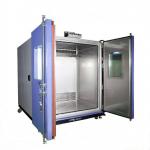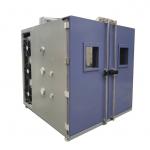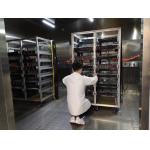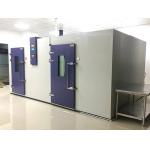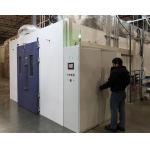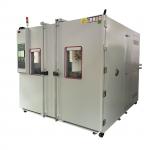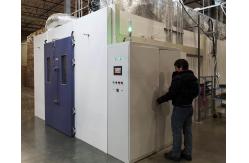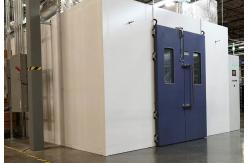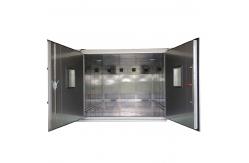In the automotive manufacturing and design process, ensuring the
durability and quality of car body and interior components is of
utmost importance. The Customized Walk-In Environmental Chamber
serves as a crucial tool for subjecting these components to a wide
range of environmental conditions, allowing for comprehensive
testing and optimization. This specialized chamber is designed to test car body parts such as
panels, frames, and doors, as well as interior components like
seats, dashboards, and upholstery. It caters to automotive
manufacturers, suppliers, and research institutions. The core
objective is to simulate the diverse environmental stresses that
these components face during a vehicle's lifespan, including
temperature variations, humidity levels, sunlight exposure, and
chemical contaminants. By conducting detailed tests, potential
weaknesses and areas for improvement can be identified, leading to
enhanced product quality and customer satisfaction. - Spacious and Durable Construction
- The walk-in chamber is built with a heavy-duty framework, typically
made of high-strength steel, to support the size and weight of car
body and interior components. The exterior is engineered to be
highly durable and resistant to corrosion, ensuring a long service
life. The interior is designed with a smooth and non-reactive
surface to prevent any damage to the tested samples. The door is
large and features a reliable sealing mechanism, incorporating a
high-quality gasket and a multi-point locking system, maintaining a
stable and controlled testing environment. The chamber also
includes proper ventilation and exhaust systems to manage any fumes
or gases generated during testing.
- Precision Environmental Control Systems
- Temperature Control: Capable of maintaining a wide temperature
range, from -40°C to +100°C, with an accuracy of ±0.5°C. It
utilizes advanced refrigeration and heating technologies, such as
industrial-grade compressors and high-power heating elements. The
control system incorporates a feedback loop with multiple
temperature sensors strategically placed throughout the chamber,
ensuring uniform temperature distribution. The user-friendly
control panel allows for precise programming of temperature
profiles, including rapid temperature changes and extended soak
times, replicating real-world conditions like cold winter nights
and hot summer days.
- Humidity Control: The humidity control system can achieve humidity
levels from 5% to 95% RH, with an accuracy of ±3% RH. It employs a
combination of steam injection and dehumidification methods, along
with a carefully designed air circulation pattern. Humidity sensors
continuously monitor the internal environment, and the control
system adjusts accordingly to create the desired humidity levels.
This is essential for testing the effects of moisture on
components, such as the growth of mold on upholstery or the
corrosion of metal parts in humid conditions.
- UV and Sunlight Simulation: To mimic the effects of sunlight, the
chamber is equipped with high-intensity UV lamps. The UV spectrum
and intensity can be adjusted to replicate different levels of
solar radiation. This allows for the evaluation of how car body
paint and interior materials fade, crack, or degrade over time due
to UV exposure. Additionally, the chamber can simulate the heat
generated by sunlight, further enhancing the realism of the testing
environment.
- Chemical and Corrosion Resistance Testing: The chamber can
introduce various chemical contaminants, such as salt spray, acid
rain, and automotive fluids, to test the resistance of components.
It has a dedicated spraying system and a corrosion-resistant
interior lining to ensure accurate and reliable testing. This is
crucial for assessing the durability of car body parts and their
ability to withstand environmental pollutants and corrosive
substances.
- Advanced Instrumentation and Data Acquisition
- The chamber is outfitted with a comprehensive suite of sensors and
instrumentation. Temperature, humidity, UV intensity, and chemical
concentration sensors are connected to a state-of-the-art data
acquisition system. The data acquisition system offers a high
sampling rate, typically ranging from 100 to 500 samples per
second, ensuring that even the most rapid changes in environmental
conditions are accurately captured. The collected data can be
accessed and analyzed in real-time or retrieved later for in-depth
studies. The system is also compatible with automotive
industry-specific data analysis software, enabling the generation
of detailed reports and graphical representations of the test
results.
- Safety and Compliance Features
- The Customized Walk-In Environmental Chamber is designed with
multiple safety features. It has an automatic shutdown system in
case of any critical malfunction, such as overheating or excessive
chemical leakage. The ventilation system is designed to quickly
remove any harmful gases or fumes, protecting the operators and the
surrounding environment. The chamber also complies with relevant
automotive testing standards and regulations, ensuring that the
testing procedures are reliable and recognized within the industry.
- Chamber Size and Capacity: The chamber is available in various sizes, with interior
dimensions ranging from 3 meters x 3 meters x 2 meters to larger
configurations suitable for testing full car bodies or multiple
interior components simultaneously. The volume can be adjusted
according to the specific needs of the customer, ensuring efficient
use of space and proper testing of different-sized samples.
- Temperature Cycling Rate: Can perform temperature cycles at a rate of 2 to 5 cycles per
hour, depending on the test requirements. For example, it can
rapidly cool from +80°C to -20°C in a matter of minutes and then
heat back up, subjecting the components to significant thermal
stress, which is essential for evaluating thermal fatigue
resistance.
- Humidity Cycling Rate: The humidity can be cycled within 15 to 30 minutes, allowing for
the simulation of rapid changes in moisture conditions, such as
transitioning from a dry desert environment to a humid
rainforest-like atmosphere.
- UV Intensity and Exposure Time: The UV lamps can produce intensities ranging from 0.5 W/m² to 1.5
W/m², and the exposure time can be precisely controlled from a few
hours to several weeks, depending on the desired test severity and
the specific materials being tested.
- Chemical Concentration and Exposure Duration: The chamber can introduce chemical contaminants at concentrations
ranging from 1% to 10% (by volume), and the exposure duration can
be set from a few minutes to several days, allowing for a
comprehensive assessment of the components' chemical resistance.
- Data Acquisition Rate: The data acquisition system samples sensor data at a rate of 200
to 500 samples per second, providing detailed and accurate
information about the environmental conditions and the performance
of the tested components during the test.
- Realistic Environmental Simulation for Component Evaluation
- The primary function of this chamber is to provide a highly
accurate and realistic simulation of the environmental conditions
that car body and interior components will face. By precisely
control
|
